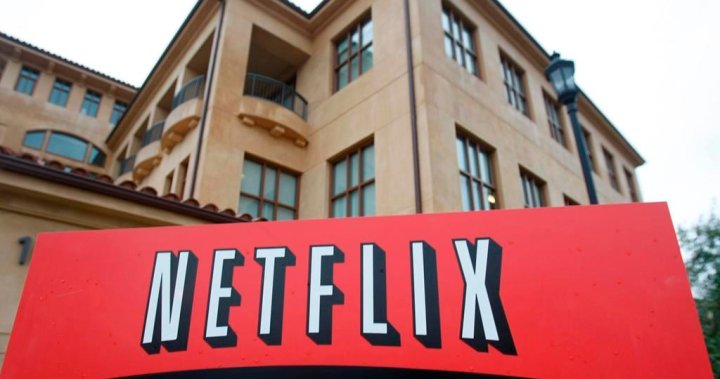Executives from Canada’s major broadcasters and a Netflix official spoke before a parliamentary committee on Friday, saying changes need to be made to bring Canada’s broadcasting landscape into the 21st century.
Where they differed, however, was in how best to go about it.
“We believe we are well-equipped to compete with companies even as big as Netflix and Disney and Amazon. But we have to do it with a level playing field,” said Troy Reeb, executive vice-president of broadcast networks for Corus Entertainment.
“We can’t do it in a way that we are so heavily regulated…While our new primary competitors — and make no mistake, Netflix is the biggest television network in Canada every night in primetime — our new biggest competitors face no regulatory burden at all.”
Corus Entertainment is the parent company of Global News.

The politicians, executives and officials were gathered in a House of Commons heritage committee meeting Friday to discuss the Liberals’ proposed Bill C-10, which outlines sweeping changes for the Broadcasting Act.
Those changes include allowing the Canadian Radio-television and Telecommunications Commission (CRTC) to lay down the law for online broadcasters, in addition to those traditionally included under the Act.
“Services such as Crave, Tou.TV, Netflix, Amazon Prime, and Spotify would be subject to the Act and could be required to contribute to the Canadian broadcasting system as determined by the CRTC,” reads a government webpage explaining the bill’s plans.
Read more:
Netflix plans to open office in Canada
The bill does not, however, force multinational corporations to collect and remit GST nor any other corporate taxes that Canadian broadcasters are forced to pay — though the government pledged in its November fiscal update that this would change in future reforms.

While Canadian companies like Corus and Bell Media have to spend around 30 per cent of their revenues on Canadian content, Netflix and others like it aren’t weighed down by these kinds of regulations, Reeb explained.
On top of that, he said the multinational companies aren’t forced to collect GST or HST on their services — shifting the playing field against Canadian companies who are forced to do so.
Now, broadcasters want Ottawa to fix it.
“If the issue of equity is front and centre, then the problem will go away. Because if (internet broadcasters are) not paying the fees, then the Canadian broadcasters should not be obliged to pay the fees,” said Richard Stursberg, an entertainment executive who served as executive vice president of CBC/Radio Canada for six years, told the committee.
“This level of unfairness is completely corrosive to actually the production of Canadian shows, Canadian culture. And so the faster you can move (the bill), the better.”

Reeb also expressed his support of the proposed legislation.
“The situation is urgent and it’s dire. We’ve seen the ongoing degradation of employment levels at local broadcasters across the country,” Reeb explained.
“This isn’t just about companies like Corus, Quebecor, Bell, Rogers. This is about small broadcasters across the country who continue to lose advertising dollars to companies like Facebook and Google and continue to lose audiences to companies like Disney and Netflix. That is not sustainable.”
Read more:
Netflix, other streaming services should be forced to create CanCon, pay digital tax: panel
As broadcasters push for the government to bring internet broadcasters under its regulatory umbrella, a representative from Netflix pushed back on the idea that the company should be treated in the same way as Canadian companies like Bell, Corus and Rogers.
“We are not saying that we do not wish to contribute. We want to participate in the system,” said Stéphane Cardin, a director of public policy for Netflix.
“It’s just that doing so should be done in a manner…that takes into consideration the nature of our service. And as I mentioned before, our service is really just about entertainment programming.”

His main contention was the possibility of Netflix being forced to dedicate around a third of its Canadian revenues to Canadian content — though Cardin pledged that Netflix “will continue to bring Canadian stories to the world.”
“Simply imposing the regulatory obligation of the licensed Canadian broadcasters onto online entertainment services would not be an appropriate approach to ensuring contributions from this otherwise vibrant sector,” Cardin said.
“Services like Netflix do not perform the same roles as traditional broadcasters, nor do we have the same content strategies.”
During his own testimony, Reeb explained that he doesn’t necessarily believe Netflix should be subjected to the exact same rules as traditional Canadian broadcasters are currently following. He said it’s about making sure there aren’t any unfair advantages — even if that means tweaking the rules for the traditional broadcasters, too.
“We think the right balance is somewhere in between,” Reeb said.
“If you’re going to bring one up, then certainly you can bring the regulations down on the Canadian players, give us more flexibility to be able to compete on an international scale, and offset some of what the producers might worry they might lose in the short term from Canadian broadcasters by providing them much more from the Internet.”

Stursberg also noted that the current Canadian content requirements should also be looked at as a whole. He explained that while the current rules put an emphasis on ensuring the team behind Canadian content are Canadians, it falls short when it comes to actually showcasing Canadian culture.
“This has been historically the case, where Canadians have made shows, but they’ve often disguised Toronto for Chicago or whatever it happens to be,” Stursburg explained.
“If you take something like Schitt’s Creek, which is an enormously successful, brilliantly done comedy, you would never know for one minute that that was Canadian. You wouldn’t know it. There’s no reference to the people being Canadian. There’s no reference to the setting being Canadian.”

He recommended that the government consider taking the U.K. approach to its content test, wherein the point system not only considers what happens behind the camera, but also in front of it.
“It serves to ensure that when you’re spending what is, in effect, public money, whether it’s money that’s derived from tax credits or from the Canadian Media Fund, or the money that the broadcasters are obligated to spend, that you’re going to get shows that are genuinely about us,” Stursburg said.
Meanwhile, the legislation is currently making its way through Parliament, where politicians will be able to consider the arguments presented by these and other voices as the debate whether to amend — or pass — the proposed law continues.
© 2021 Global News, a division of Corus Entertainment Inc.


